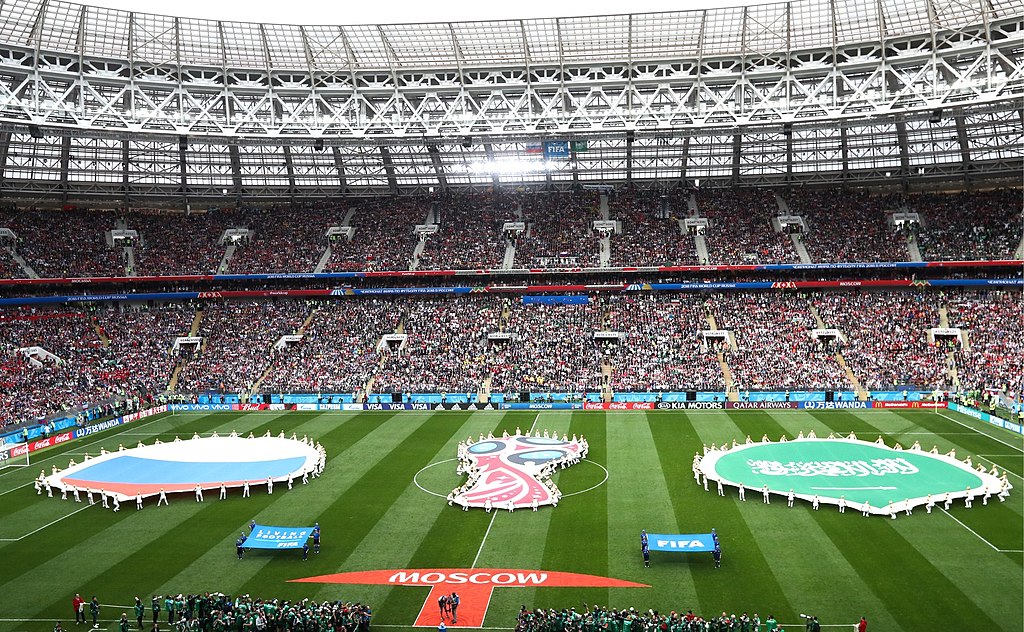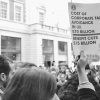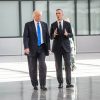
The FIFA World Cup in Russia, the sporting event with the largest TV audience, is helping to overcome the Putin regime’s international isolation, at least in the West. This is what the President was hoping for, with the second large-scale global event of this kind in Russia in the past few years, following the Winter Olympics hosted by Sochi in 2014. The simple fact of organising the World Cup is a coup in its own right, and it has enhanced the image of both Russia and Putin. Putin has always seemed to focus more on the World Cup as an event than on his own national team, although the unexpectedly strong showing by the Russian team must have taken many by surprise, starting with the Kremlin itself.
The official poster was an early sign of the World Cup’s geopolitical baggage, as Max de Haldelang astutely points out. With its constructivist style, full of ‘great power’ Soviet resonances, the protagonist is the great goalkeeper Lev Yashin (1929-1990). But it is also an allusion to the space race, which for a time in the Cold War Moscow managed to lead. The foreign visitors –over half a million of them– expected in various Russian cities will get to know the country at first hand, but the event in itself is not a money-spinner, as this analysis by the World Economic Forum makes clear.
This afternoon, the Official Poster for the @FIFAWorldCup was launched in Moscow. No doubt about the star of the show for the media!
Learn more about the poster's inspiration: https://t.co/wfJW8vsHNY pic.twitter.com/GRRrPKQ7l1— Fatma Samoura (@fatma_samoura) November 28, 2017
The timing is important, with the fracturing of the West, most recently evident in Donald Trump’s bust-up with his allies at the latest G7 summit in Canada. The US President’s request to readmit Russia to this organisation, from which it was expelled in 2014 after the occupation and annexation of Crimea and the war in eastern Ukraine, works to Putin’s advantage. Trump’s obsession is China, not Russia, which he wants to be able to count on in his long-term tussle with Beijing. Indeed, Trump and Putin will hold a bilateral meeting on third-party territory, in Helsinki on 16 July, a triumph for the Russian just days after the NATO summit, itself of uncertain outcome. Even the French President, Emmanuel Macron, has indicated a willingness to invite Putin to the next G7 summit, under a French Presidency, providing Moscow makes certain gestures, such as reaffirming the Minsk process for a solution in Ukraine. Meanwhile, Putin has been rubbing shoulders with Xi Jinping at the Shanghai Cooperation Organisation summit held in Qingdao.
The opening ceremony for the World Cup was austere. And Putin’s speech was marked by restraint and a call for ‘football to unite’, although it is unusual for the Head of State of the host country to speak at all at that juncture. For the opening game, played between Russia and Saudi Arabia, sitting next to Putin was the latter country’s most powerful (and transformative?) man, Crown Prince Mohamed bin Salman (known as MBS). All this was despite his differences with Putin over Syria and other issues. It is true that the West has so far been barely represented in the VIP balconies. But the diplomatic boycott that London (in the form of both the Royal Family and government) called due to the attempted assassination of the Russian agent Sergei Skripal and his daughter in Salisbury seems not to have been widely heeded. It remains to be seen what will happen –and what teams will be involved– when we get to the semi-finals. At any event, the situation is a long way from the boycott of the Moscow Olympics in 1980 after the Soviet invasion of Afghanistan.
According to the French analyst Pascal Boniface, ‘football has developed much more than democracy; it is a factor in international influence using soft power’. Putin has sought to convey some geopolitical messages with the competition: mainly that the Western sanctions have not left any great mark on his country (although in fact they have). One notable aspect is Kaliningrad, a militarised Russian enclave located between Poland and Lithuania that was annexed by Russia in 1945 and that Germany has never reclaimed. Formerly it was the Prussian Königsberg of Immanuel Kant, the philosopher with a very different idea of everlasting peace. Kaliningrad is today home to the Russian Baltic Fleet and the (potentially nuclear) Iskander missiles pointing at Europe. Putin ordered a 35,000-seater stadium to be built there, when the local team normally attracts no more than 4,000 spectators. In the World Cup it has been used for only four games, among them Spain vs Morocco on 25 June. The enclave is a show of strength in the face of NATO.
The World Cup has served, temporarily at least, to mask the allegations of corruption made against FIFA’s executive committee following the decision to award the 2018 and 2022 finals to Russia and Qatar, two authoritarian regimes. And in recent weeks, the Putin regime has played down its disapproval of the LGBT community.
The ‘Beautiful Game’ is a mirror of the global economy, as the economist Francesc Trillas astutely points out in his book Pan y Fútbol (2018). Some aspects of globalisation are reflected at the World Cup, admittedly in a strange way, because the two greatest powers, the US and China, are absent. The US –scourge of corruption in FIFA– has spent years trying to get its populace to like football. For the time being it has succeeded more with women’s football than with the men’s game. And as part of this attempt it will host, along with Mexico and Canada (the first time it will have been held in three countries), the 2026 World Cup, even though the future of the North American Free Trade Agreement (NAFTA) is on a knife-edge. As far as China is concerned, the plan is to be fully integrated into the sport by 2030 and to win by 2050.
There is another aspect of globalisation in football, as an editorial in the Financial Times recently pointed out: in general and despite individual exceptions, the team football played at the World Cup has for decades been poorer than, for instance, in the European Champions League. Since the European Court of Justice issued its Bosman ruling in 1994, ending protectionism in privately-owned sport, the best players in the world have been playing in the top Champions League teams. Europe is dominant in this, although often thanks to non-European players. But of course, national emotions are always to the fore. In this respect the World Cup, with its surprises and displays of nationalistic pride, is unbeatable.


